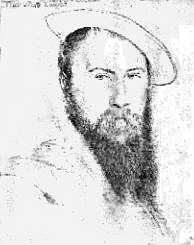Sir Thomas Wyatt
Sir Thomas Wyatt* was a pioneer in bringing to English poetry the new forms of the Italian Renaissance, especially the Petrarchan* sonnet.
My galley charged with forgetfulness
Thorough sharp seas in winter nights doth pass
'Tween rock and rock; and eke mine enemy, alas
That is my lord, steereth with cruelness;
And every oar a thought in readiness
As though that death were light in such a case.
An endless wind doth tear the sail apace
Of forced sighs and trusty fearfulness.
A rain of tears, a cloud of dark disdain
Hath done the wearied cords great hindrance,
Wreathed with error and eke with ignorance.
The stars be hid that led me to this pain
Drowned is reason that should me comfort
And I remain despairing of the port.
A translation of Petrarch's original*.
Shakespeare's sonnets are discussed in the section on his life.
Or listen to one of Wyatt's poems set to music.*
Footnotes
-
Sir Thomas Wyatt
Wyatt (1503-1542), travelled in Italy, where he found models for much of his poetry. He spent a period in the Tower because of an alleged involvement with Anne Boleyn.
-
Petrarch
One of the great voices of the early Renaissance, Francesco Petrarch (1304-74) created the great sequence of sonnets to his courtly love, Laura. By the time Shakespeare was writing, the freshness and originality of many of Petrarch's images had become clichés worthy of ironical treatment, notably in his sonnets to the Dark Woman.
-
Petrarch's original (translated)
My ship laden with forgetfulness passes through a harsh sea, at midnight, in winter, between Scylla and Charybdis, and at the tiller sits my lord [i. e. his loved one], rather my enemy;
each oar is manned by a ready, cruel thought that seems to scorn the tempest and the end; a wet, changeless wind of sighs, hopes, and desires breaks the sail;
a rain of weeping, a mist of disdain wet and loosen the already weary ropes, made of error twisted up with ignorance.
My two usual sweet stars are hidden; dead among the waves are reason and skill; so that I begin to despair of the port.
(Translated by Robert M. Durling; from Petrarch's Lyric Poems Cambridge, MA: Harvard University Press, 1976.) -
A lyric set to music
Set by his contemporary, William Cornyshe, Wyatt's lyric has been set as a "catch," or round. The poem is a debate between two common--and interconnected-- views of women. Click for more on the battle of the sexes.
Listen to "Ah Robin":
Ah Robin
Gentle Robin
Tell me how thy leman [loved one] doeth
And thou shalt know of mine.
My lady is unkind I wis!
Alack why is she so!
She loveth another better than me,
And yet she will say no.
(Refrain)
I cannot think such doubleness
For I find women true,
She hath ta'en my heart and left me well,
She will change for no new.
(Refrain)
Thou art happy while that doeth last,
But I say as I find,
That women's love is but a blast
And turneth with the wind.
(Refrain)
